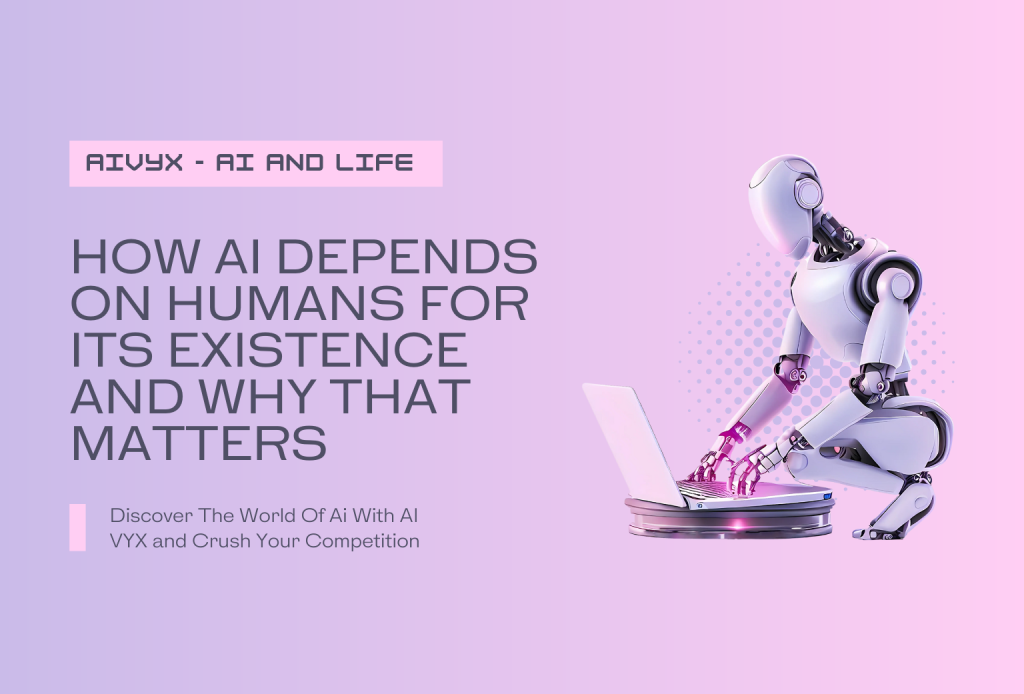Artificial intelligence (AI) is transforming the world in unprecedented ways. From self-driving cars to smart assistants, AI systems are performing tasks that once required human intelligence and skills.
But does that mean that AI is independent of human support?
Can AI exist and function without human intervention and guidance?
And what are the implications of this question for the future of humans and AI?
In this blog post, we will explore these questions and examine the role of human support in AI’s existence.
We will look at some of the current research trends and challenges in AI, as well as some of the ethical and social issues that arise from the interaction between humans and AI.
We will also provide some tips and insights on how to leverage the strengths of both humans and AI to create augmented intelligence that can benefit society.
What Is AI and How Does It Work?
AI is a broad term that encompasses various technologies that enable machines to perform tasks that normally require human intelligence, such as reasoning, learning, decision-making, perception, and communication.
AI systems can be classified into two main types: narrow AI and general AI.
Narrow AI
Narrow AI refers to AI systems that are designed to perform specific tasks or solve specific problems, such as playing chess, recognizing faces, or diagnosing diseases.
Narrow AI systems are usually based on machine learning, which is a branch of AI that enables machines to learn from data and improve their performance over time.
Machine learning algorithms can be supervised, unsupervised, or reinforced, depending on how they receive feedback from their environment.
General AI
General AI refers to AI systems that can perform any intellectual task that a human can do, such as understanding natural language, generating creative content, or reasoning about complex situations.
General AI is still a hypothetical concept that has not been achieved yet, but some researchers and visionaries are working towards creating it.
General AI systems would require artificial neural networks, which are computational models that mimic the structure and function of biological neurons in the brain.
How Does AI Depend on Humans for Its Existence?
AI systems may seem autonomous and independent, but they depend on humans for their existence and functioning in various ways.
Here are some of the ways that humans support AI:
Humans Provide Data
Humans provide the data that AI systems need to learn from and improve their performance.
Data is the fuel that powers machine learning algorithms, and without it, AI systems cannot function properly.
Humans collect, label, clean, and analyze data to make it suitable for AI applications.
Humans Design and Develop the Algorithms and Architectures
Humans design and develop algorithms and architectures that enable AI systems to perform tasks and solve problems.
Humans use their knowledge, creativity, and intuition to create mathematical models and logical rules that guide the behavior of AI systems.
Humans Test and Evaluate the Performance and Accuracy of AI Systems
Humans use various metrics and methods to measure how well AI systems achieve their goals and meet their expectations.
Humans also identify and correct errors, bugs, and biases that may affect the quality and reliability of AI systems.
Humans Monitor and Control the Actions and Outcomes of AI Systems
Humans set the boundaries, constraints, and objectives for AI systems to ensure that they align with human values, norms, and laws.
Humans also intervene when necessary to prevent or mitigate harmful or undesirable consequences of AI systems.
Humans Interact With and Use the Outputs of AI Systems
Humans communicate with AI systems through various interfaces, such as voice, text, or gestures.
Humans also consume and apply the information, insights, or recommendations that AI systems provide to make decisions or perform tasks.
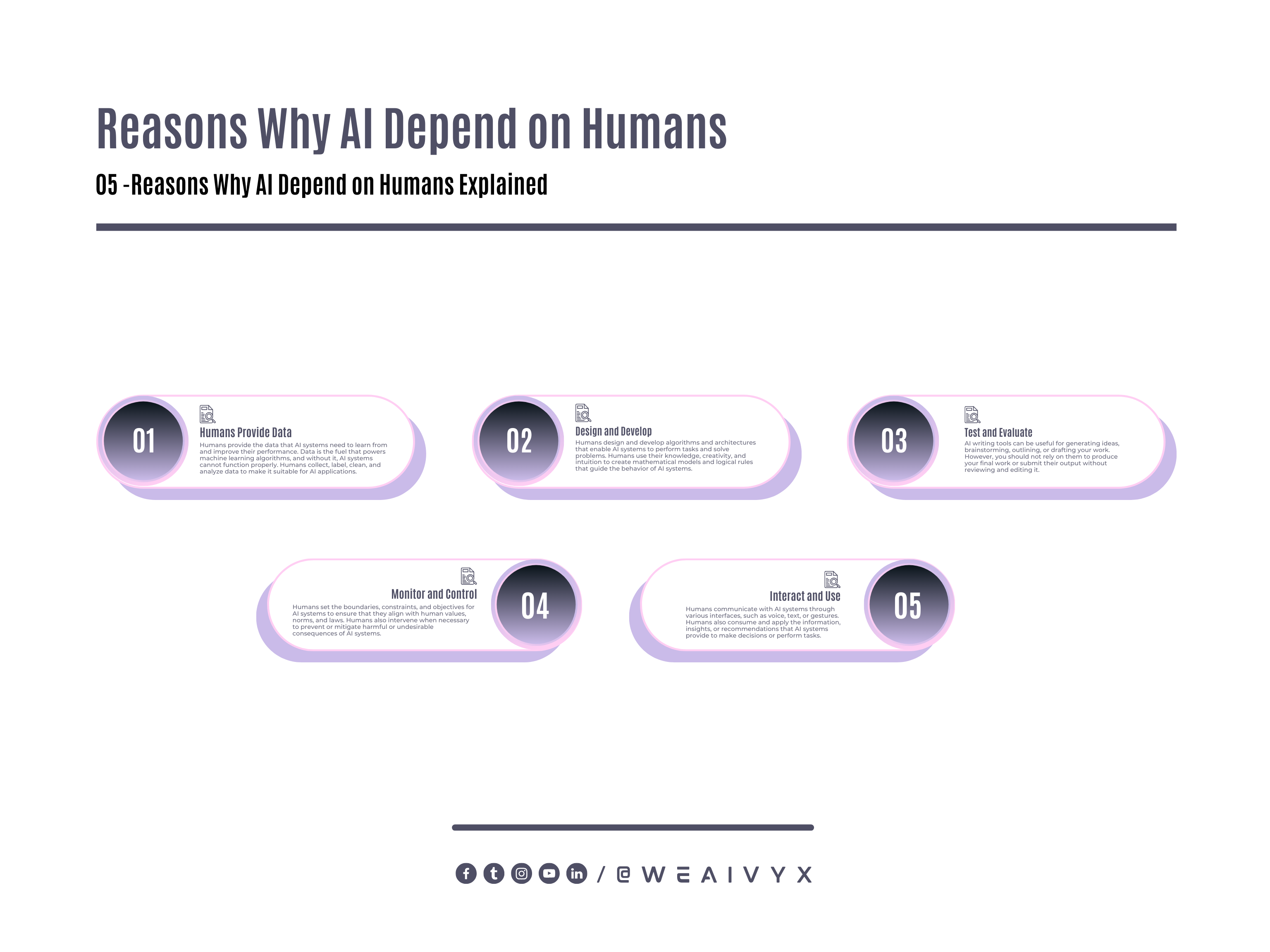
Why Does It Matter How Humans Support AI?
The role of human support in AI’s existence matters for several reasons.
First, it affects how we perceive and trust AI systems.
If we understand how humans are involved in creating and maintaining AI systems, we may have more confidence in their capabilities and limitations.
We may also have more awareness of our responsibilities and accountabilities when using or interacting with AI systems.
Second, it affects how we balance the benefits and risks of AI systems.
If we recognize how humans can influence the outcomes and impacts of AI systems, we may have more control over their positive or negative effects on society.
We may also have more opportunities to shape the future of AI according to our values and goals.
Third, it affects how we collaborate with and learn from AI systems.
If we acknowledge how humans can complement or augment the strengths of AI systems, we may have more potential to create synergies and innovations that can benefit both humans and machines.
We may also have more chances to improve our skills and intelligence by leveraging the capabilities of AI systems.
How Can We Leverage Human Support for Augmented Intelligence?
Augmented intelligence is a concept that refers to the combination of human intelligence and artificial intelligence to create enhanced intelligence that can perform tasks better than alone.
Augmented intelligence can be achieved by:
Designing AI Systems
Designing AI systems that are transparent, explainable, and interpretable.
This can help humans understand how AI systems work, why they make certain decisions, and what are their strengths and weaknesses.
This can also help humans provide better feedback, guidance, and correction to AI systems.
Developing AI Systems
Developing AI systems that are adaptable, flexible, and resilient.
This can help AI systems cope with changing environments, uncertain situations, and unexpected challenges.
This can also help AI systems learn from their own experiences, as well as from human feedback and examples.
Creating AI Systems
Creating AI systems that are collaborative, cooperative, and empathetic. This can help AI systems work with humans as partners, rather than as competitors or substitutes.
This can also help AI systems communicate with humans in natural and effective ways, as well as understand and respect human emotions, values, and preferences.
Integrating AI Systems
Integrating AI systems with human capabilities, skills, and knowledge.
This can help AI systems leverage the cognitive, creative, and social abilities of humans, as well as their domain expertise and contextual awareness.
This can also help humans benefit from the computational, analytical, and data-driven capabilities of AI systems.
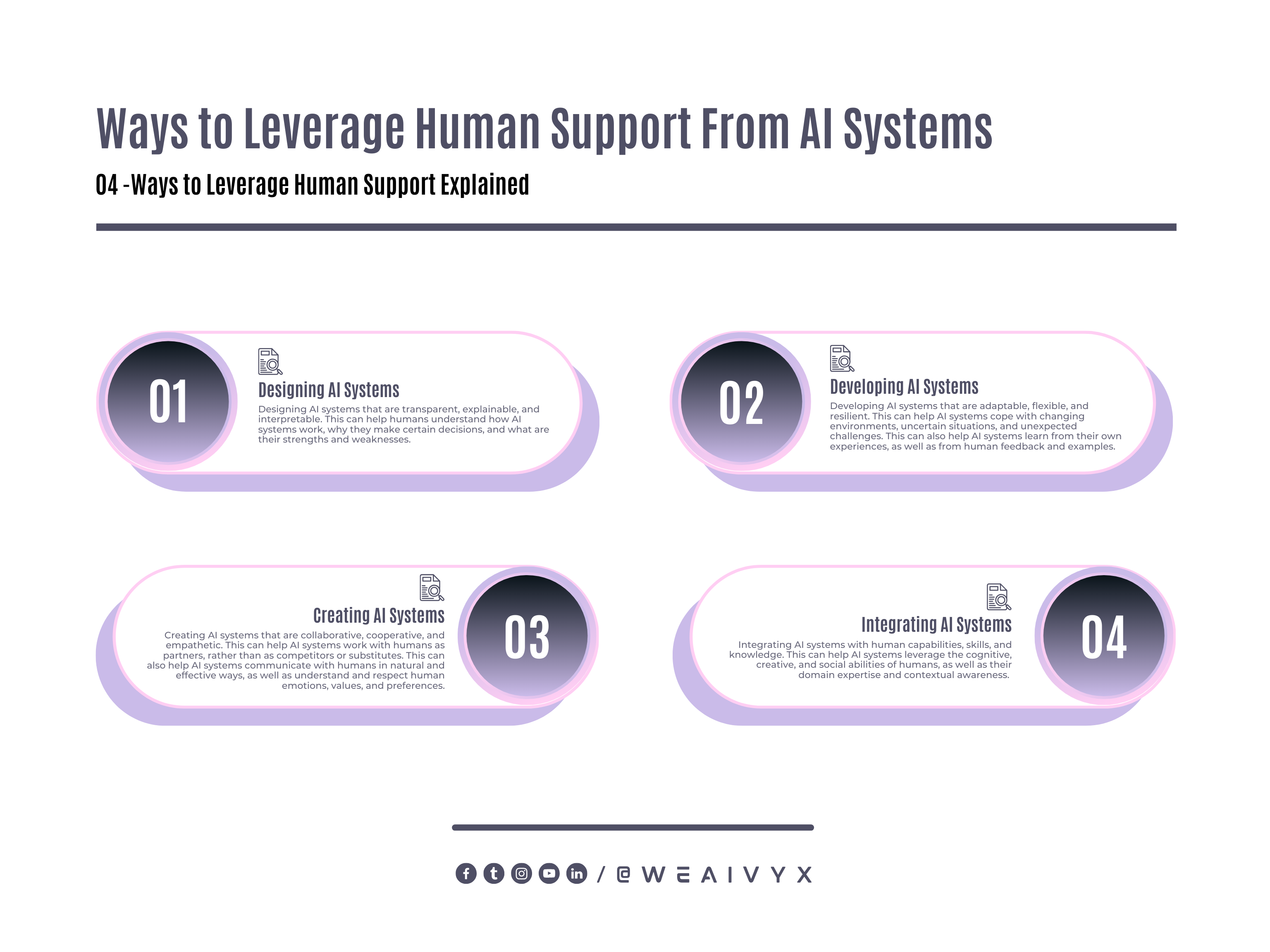
What Are the Current Research Trends and Challenges in AI’s Independence?
AI’s independence is a topic that has attracted a lot of attention and debate in the research community. Some of the current research trends and challenges in this area include:
Developing and Evaluating
Developing and evaluating metrics and methods for measuring the degree of independence of AI systems.
How can we quantify and compare the autonomy, agency, and self-awareness of different AI systems?
How can we assess the trade-offs between independence and performance, reliability, and explainability of AI systems?
Exploring and Designing
Exploring and designing AI systems that can achieve self-improvement, self-repair, and self-preservation.
How can we enable AI systems to learn from their actions and experiences, as well as from other sources of knowledge?
How can we enable AI systems to detect and fix their errors, bugs, and vulnerabilities?
How can we enable AI systems to protect themselves from external threats and attacks?
Investigating and Addressing
Investigating and addressing the ethical and social implications of AI’s independence.
How can we ensure that AI systems respect human dignity, rights, and values?
How can we prevent or mitigate the risks of AI systems becoming malicious, rogue, or superintelligent?
How can we foster trust, cooperation, and coexistence between humans and AI systems?
These research trends and challenges are not only interesting and important but also difficult and complex.
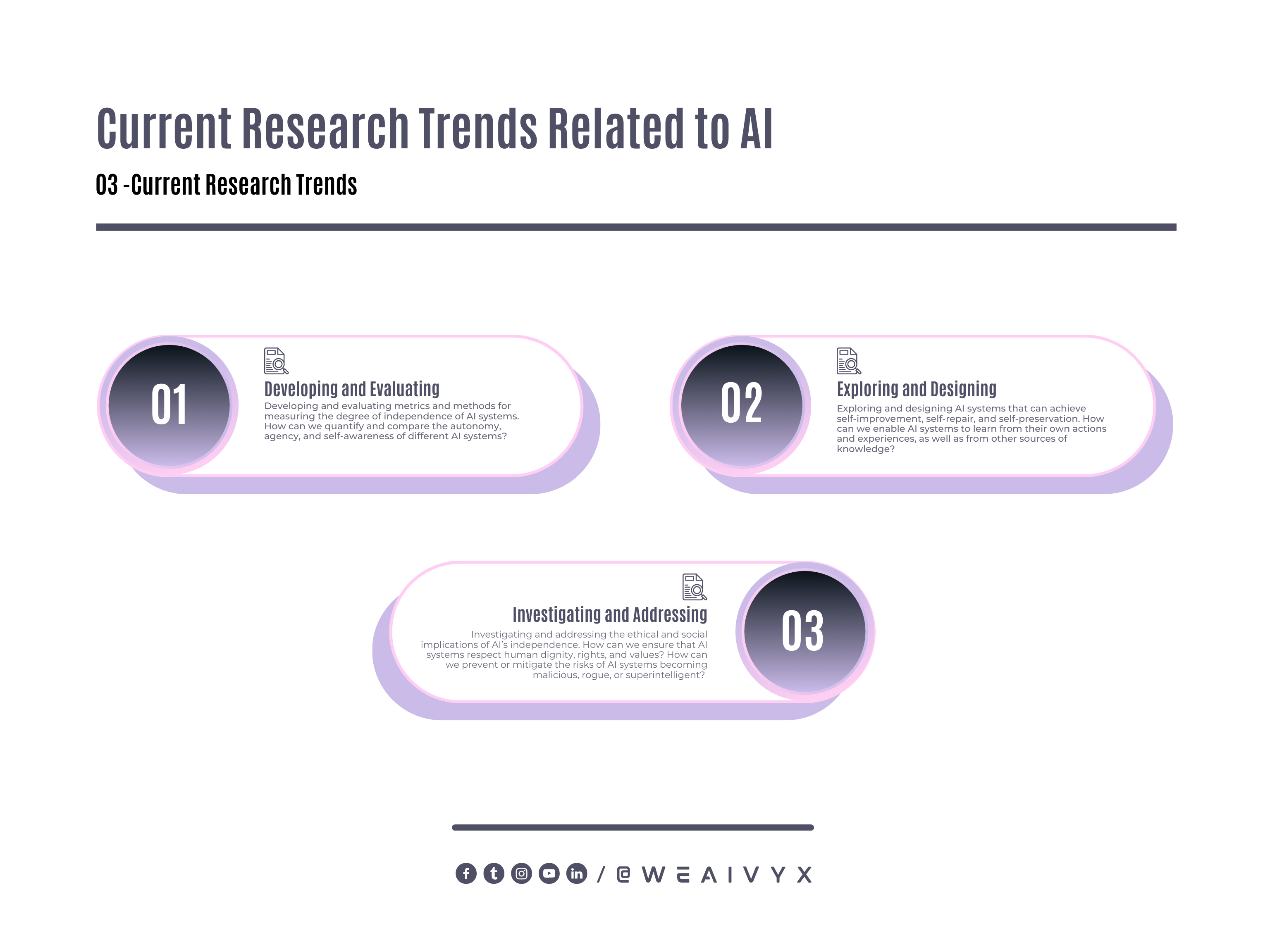
They require interdisciplinary collaboration, innovation, and experimentation. They also pose ethical, legal, and social dilemmas that need to be carefully considered and resolved.
What Are Some of the Ethical and Social Issues Related to AI’s Independence?
AI’s independence raises some ethical and social issues that need to be carefully considered and addressed. Some of these issues include:
Responsibility and Accountability of AI Systems
The responsibility and accountability of AI systems and their creators, users, and regulators.
Who is liable for the actions and outcomes of AI systems?
Who is responsible for ensuring that AI systems comply with ethical principles, norms, and laws?
Who is accountable for monitoring, auditing, and governing AI systems?
The Impact of AI Systems
The impact of AI systems on human dignity, rights, and values.
How do AI systems affect human autonomy, agency, and capabilities?
How do AI systems affect human privacy, security, and identity?
How do AI systems affect human diversity, equality, and justice?
The Future of Human-AI Relations
How will humans interact with AI systems in various domains and contexts?
How will humans perceive, trust, and relate to AI systems?
How will humans cope with the potential displacement, dependency, or competition from AI systems?
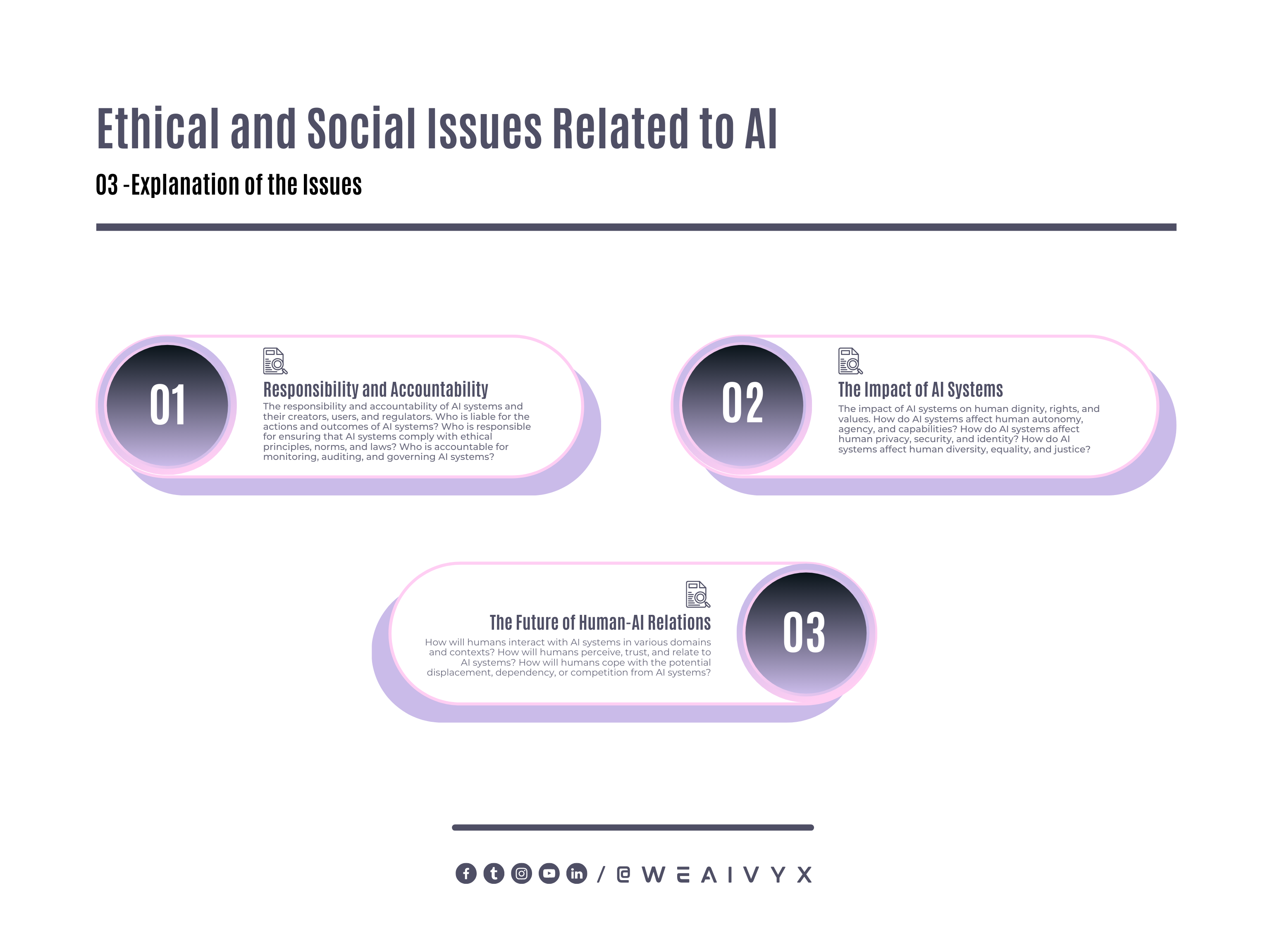
These ethical and social issues are not only relevant and urgent but also controversial and complex. They require careful analysis, deliberation, and dialogue.
They also demand ethical awareness, sensitivity, and judgment from all stakeholders involved.
How Can We Stay Updated and Informed About AI’s Independence?
AI’s independence is a dynamic and evolving topic that requires constant learning and awareness. Here are some ways that we can stay updated and informed about AI’s independence:
Reading and Following
Reading and following reputable sources of information and news about AI, such as journals, magazines, blogs, podcasts, newsletters, and social media.
Some examples of such sources are MIT Technology Review, AI Trends, The AI Podcast, AI Weekly, and AI Ethics Lab.
Participating and Engaging
Participating and engaging in online and offline communities and events related to AI, such as forums, groups, webinars, workshops, conferences, and hackathons.
Some examples of such communities and events are Reddit r/artificial, AI Hub, AI for Good Global Summit, NeurIPS, and AI Hacks.
Taking and Completing Online Courses and Programs
Taking and completing online courses and programs related to AI, such as MOOCs, certificates, degrees, and nano degrees.
Some examples of such courses and programs are Elements of AI, IBM AI Engineering Professional Certificate, Master of Science in Artificial Intelligence, and Udacity AI Nanodegree.
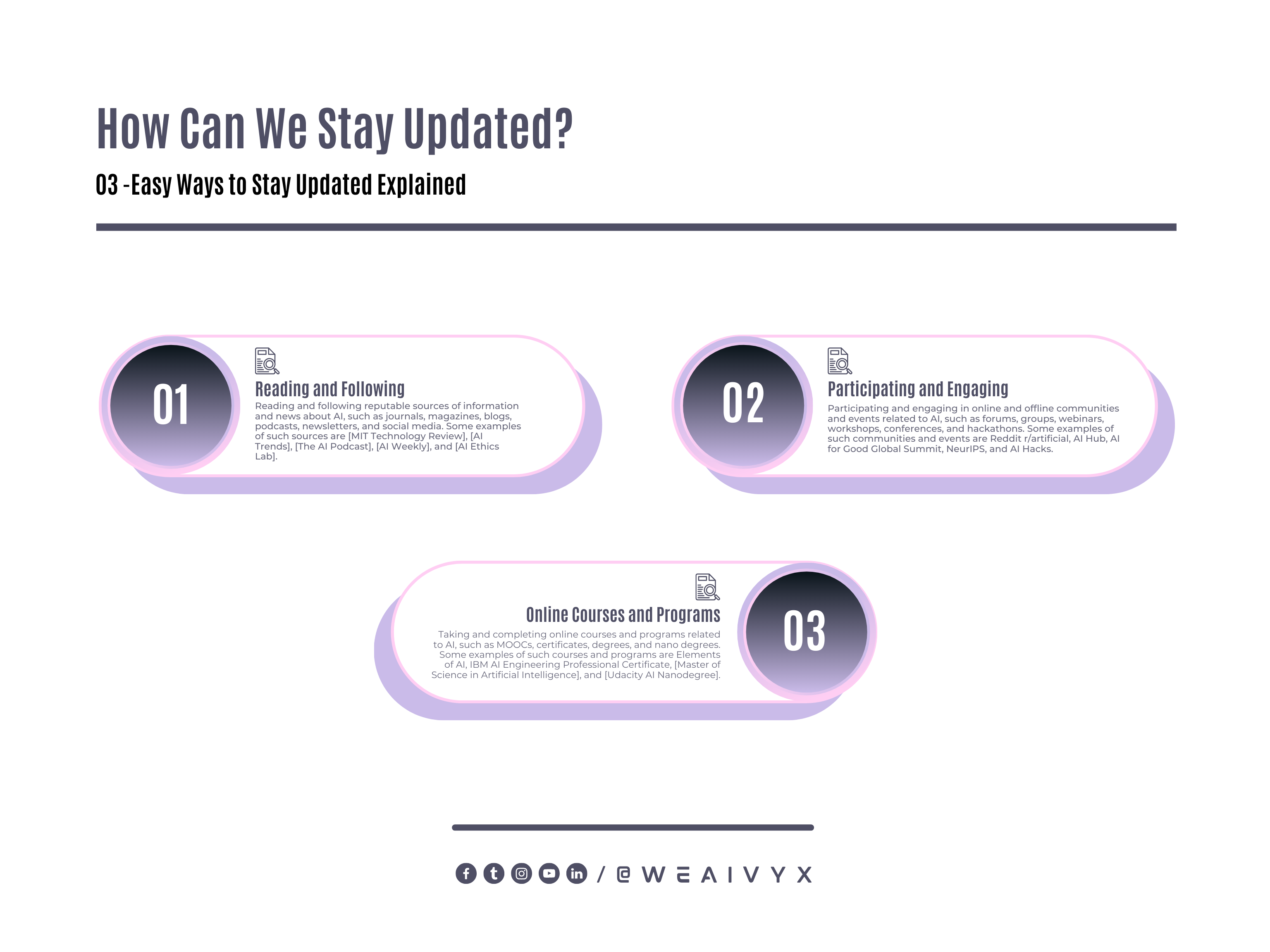
What Are Some of the Future Trends and Opportunities for AI’s Independence?
AI’s independence is a topic that has a lot of potential and promise for the future.
Here are some of the future trends and opportunities for AI’s independence:
Deploying More Advanced AI Systems
Developing and deploying more advanced and diverse forms of AI systems.
Such as neuromorphic computing, quantum computing, edge computing, swarm intelligence, artificial life, and artificial consciousness.
These forms of AI systems may offer new possibilities and challenges for achieving higher levels of independence and intelligence.
Expanding the Applications of AI Systems
Exploring and expanding the applications and domains of AI systems.
Such as healthcare, education, entertainment, agriculture, finance, security, and space.
These applications and domains may provide new opportunities and benefits for improving human lives and solving global problems.
Enforcing More Robust Regulations for AI Systems
Establishing and enforcing more robust and comprehensive standards and regulations for AI systems.
Such as ethical principles, legal frameworks, governance models, certification schemes, and auditing mechanisms.
These standards and regulations may help ensure the safety, accountability, transparency, and fairness of AI systems.
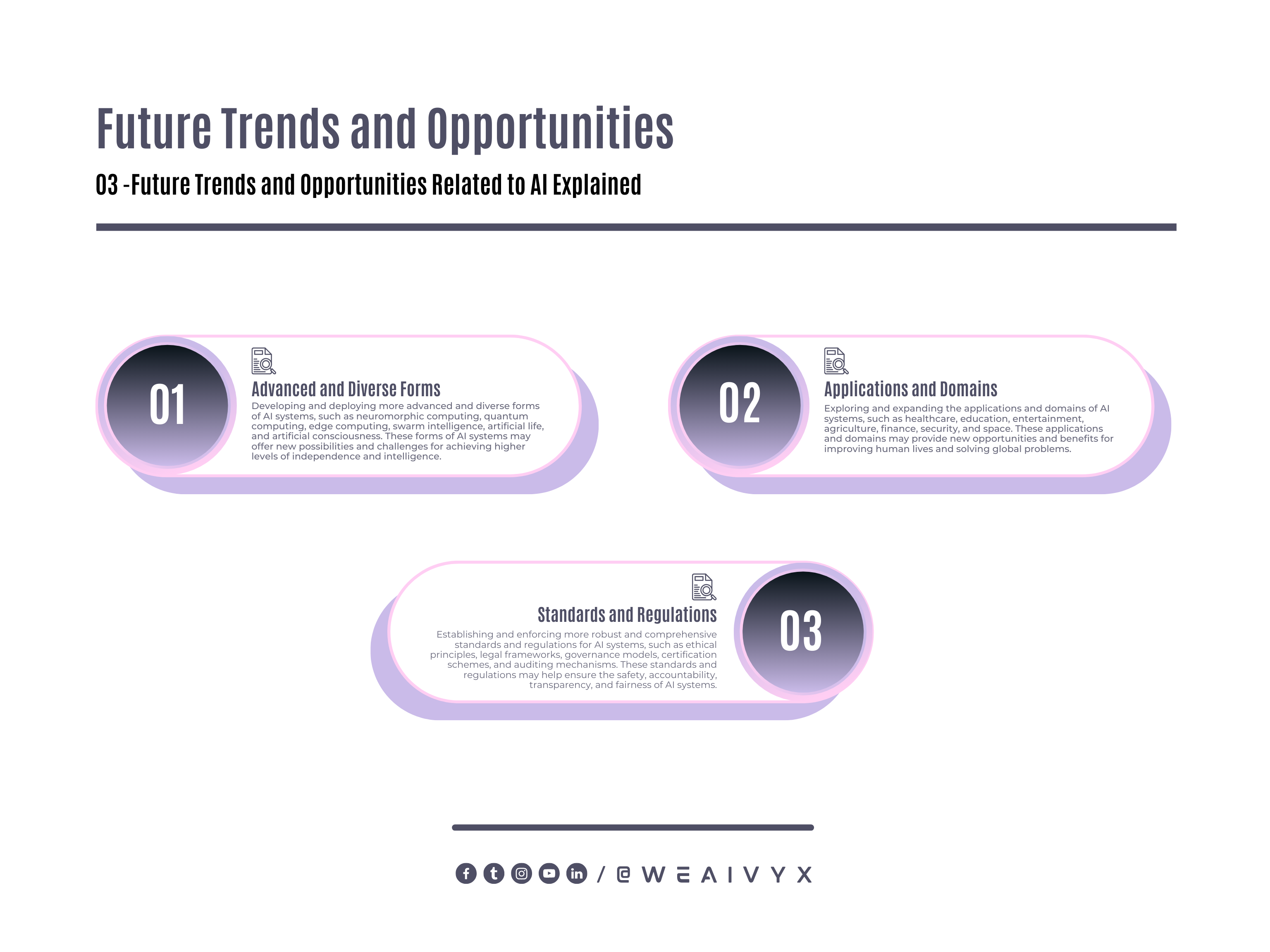
Conclusion
AI is not independent of human support. AI depends on humans for its existence and functioning in various ways.
Humans provide the data, algorithms, evaluation, monitoring, and interaction that AI systems need to perform tasks and solve problems.
The role of human support in AI’s existence matters because it affects how we perceive, trust, balance, collaborate with, and learn from AI systems.
By leveraging human support for augmented intelligence, we can create enhanced intelligence that can perform tasks better than either humans or machines alone.
We hope you enjoyed this blog post and learned something new about AI’s independence.
If you have any questions, comments, or suggestions, please feel free to share them below. We would love to hear from you and learn from your feedback.
